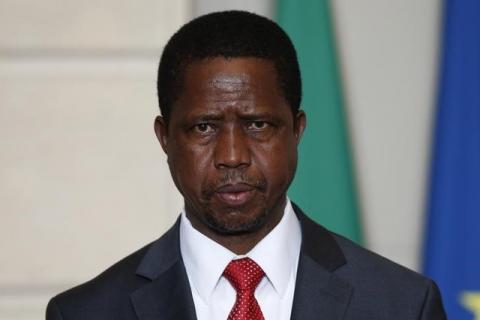Advertisement
Zambian president defends ministers staying on, says economy improving
LUSAKA (Reuters) - Zambian President Edgar Lungu, who faces a tough election challenge in August, defended on Friday an amendment to the constitution that allowed ministers to remain in office after parliament dissolved this week.
Ministers are members of parliament, and have previously vacated their offices when the assembly breaks up. The opposition fears letting them stay in place will give the government more leverage in campaigning in the southern African nation, a major producer of copper.
Lungu, who won a disputed presidential election last year after his predecessor Michael Sata died in office, told a televised news conference that the ministerial arrangement was constitutional.
"I am not insisting that ministers remain in office so that we can use government resources," he said in response to a question, adding that he was very confident of victory.
Having served out the rest of what would have been Sata's term, Lungu, a lawyer, faces a new presidential vote in August, as well as parliamentary elections in which his Patriotic Front will be challenged by the United Party for National Development led by economist Hakainde Hichilema.
Zambia is Africa's second-biggest copper producer but its economy has been hit by falling world demand, primarily due to a slowdown in China.
Lungu said he expected inflation, currently running at almost 22 percent, to slow to single digits "within months", without elaborating on how this would be achieved.
He said Zambia's budget deficit had averaged 4.8 percent of GDP in the last two years but was expected to fall to around 3 percent in the medium term, starting next year.
"Having addressed the infrastructure backlog, future deficits will be lower, averaging around 3 percent of GDP in the medium term," Lungu said.
Rainfall had greatly improved and Zambia expected a recovery in electricity generation, which had dropped due to low water levels at hydropower plants, he said.
And diversification away from the copper sector meant economic growth was seen accelerating slightly to 3.7 percent in 2016 from 3.5 percent last year.
"This performance will largely be driven by agriculture, construction and tourism," Lungu said.
On the agricultural front, Zambia has fared better than its neighbors amid a regional drought, with production of the staple maize crop forecast to rise to 2.87 million tonnes this year from 2.6 million tonnes last year.
But maize prices have still risen steeply, and Lungu said the government had been advised not to bring in price controls to make the staple more affordable. He did not specify who gave this advice.
Zambia said last month it had agreed targets with the International Monetary Fund, preparing the way for an aid program by the fourth quarter of the year. It started talks with the Fund in March after both sides agreed the budget deficit was not sustainable.
(Editing by James Macharia and Mark Trevelyan)



















Add new comment